Sacraments & Other Services

Baptism
The act of baptism is the channel for the conveyance of the grace of God upon a person, where God ‘washes away’ sin, infuses the baptised with his grace and forgiveness, and (through the Sacrament of Confirmation) imparts the ‘gifts of the Spirit’ needed before anyone can grow into Christian perfection.
Read MoreMarriage
Marriage is a channel for the conveyance of the grace of God upon a man and a woman who have freely asked for it, in order to bring about in them a permanent change by making "the two of them one flesh", and to enable them to attain the change that marriage has in view: the preservation and increase of the human race; the promotion of helpfulness; the restraint of passions and their submission to the moral law; and the Christian upbringing of children.
Read moreFuneral
In the Orthodox Church, funerals and the mystery of death with which they are entwined, touch people many times in one way or another throughout their lives. The funeral is not just a memorial service to elicit comfortable memories about a person who has passed away. A funeral is very much a statement of faith in the Person of Jesus Christ, His Power and His Resurrection.
Read More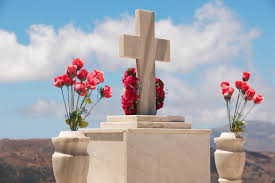
Cremation vs Burial
The Orthodox Church forbids the cremated remains of anyone to be brought into the temple for services, or for any other reason, and funeral services over cremated remains is strictly forbidden. The practice is seen as a denial of the bodily resurrection, not because God can't raise the dead from ashes, but because the practice does not reflect the Church's teaching that the body of a believer housed the Holy Spirit. It is also ignoring the fact that believers receive, in their lifetime, the very Body and Blood of Christ, and the body is therefore made holy in preparation for that day when we shall be united in both body and soul, to live forever with God.
Read More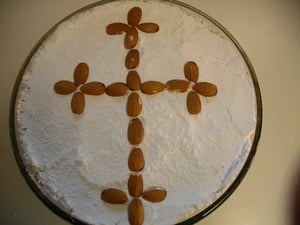
Memorial Service (Trisagion)
The Apostolic Constitutions recommend Memorials on the third day after a person has passed away, representing Christ’s death and Ressurection on the third day. The ninth day “as a reminder of the living and the dead”, and “on the fortieth day according to ancient practice.” (The people of Israel mourned for the great Moses in this way.) St Symeon of Thessaloniki interprets these important days as: “The three day Memorial we do for the Holy Trinity, because from the Holy Trinity we have our existence and our life. The nine day Memorials remind us of the nine orders of holy Angels, among which our beloved one has been numbered. The fortieth day Memorial is for the Ascension of our Saviour. The three-month, six-month and nine-month symbolize the Holy Trinity”.
Read More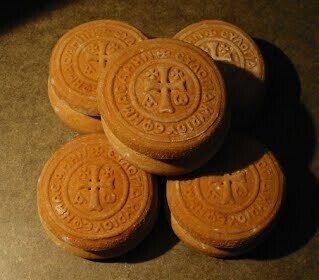
Blessing of the Five Loaves (Artoklasia)
The Blessing of the Five Loaves of Bread is a brief service of thanksgiving through which we express our gratitude for all the blessings of life. The Blessing of the Loaves is meant to remind the faithful of the miracle of the multiplication of the bread and fish by which Christ fed a vast multitude. It is traditional that oil, wine, wheat and five loaves of sweet bread, as the most basic elements of life, are used in this small prayer service.. Any individual or family desiring to offer an Artoklasia on a Sunday can make an enquiry with the Parish for further information.
Read More (inc Recipes)
Anointing of the Sick (Holy Unction)
The service of ‘Holy Unction’ is spiritual medicine for sickness which has at its heart a spiritual disease – our mortality which we inherit from the sin of the spiritually human nature that we all share. Sickness is not only physical and mental it is the result of the sinful nature we possess. The service of Holy Unction’ is held in times of sickness and as a preparation for our celebration of the eternally salvific act of the death and Resurrection of our Lord at the time of Holy Week and Easter (Pascha). These show clearly that ‘Holy Unction’ is inextricably linked not only to actual sickness but to God forgiving us our sins. It is the response of the Tax Collector who enters the Temple to pray; he falls down upon his knees in humility, bows his head, beats his breast and says “Lord forgive me for I am a sinner” He repents by confessing his sins before God..
Read More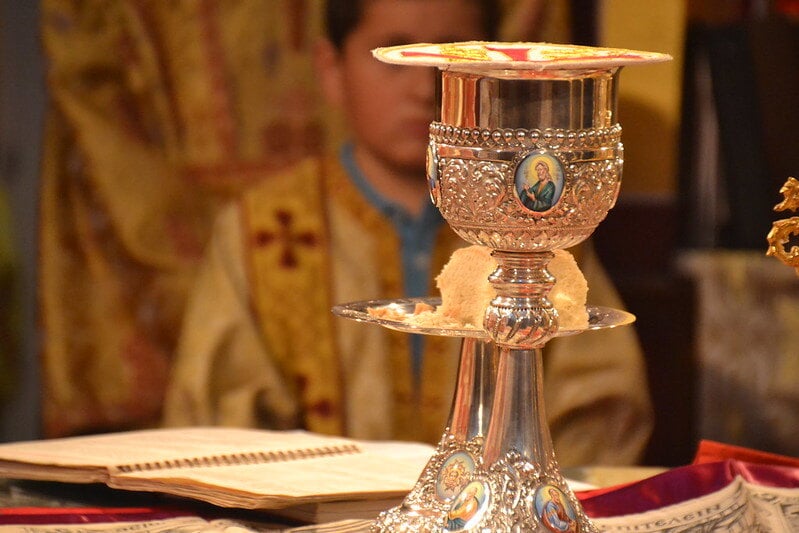
Holy Communion (Eucharist)
Holy Eucharist is the most sublime Sacrament of our Church, the Mystery of Mysteries, the Sacrament of Sacraments. It is the eternal Sacrament whose value is incomprehensible and incalculable, and whose position in the worship of our Church is unique. The Eucharist is the centre of the Church’s life. It is the completion of all of the Church’s sacraments, the source and the goal of all of the Church’s doctrines and institutions.
Read More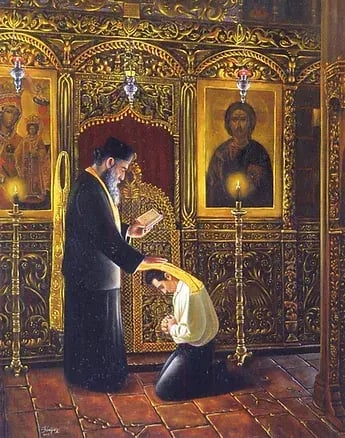
Holy Confession
The sacrament of Confession becomes the means by which we renew the saving work of our Baptism in our lives and allows the healing power of God to restore the broken relationship between us and Him caused by our sin. ‘If we confess our sins, He is faithful and just to forgive us our sins and to cleanse us from all unrighteousness.’ (1 John 1:9)
Read More